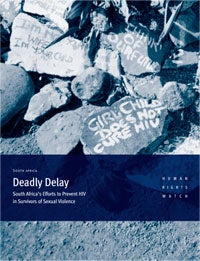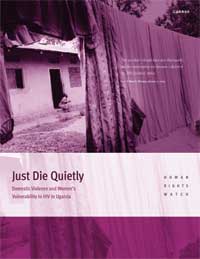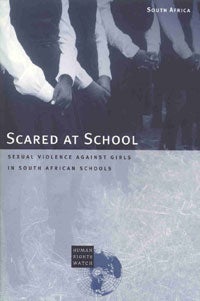 |
 |
 |
 |
“Deadly Delay: South Africa's Efforts to Prevent HIV in Survivors of Sexual Violence” South Africa: March 2004 Sexual violence against women and girls in South Africa has been a problem of epidemic proportions. In a nation with the highest reported rate of HIV/AIDS in the world, this violence could be a death sentence. In 2002, the South African government took the important step of pledging to provide rape survivors with the short, affordable course of antiretroviral drugs known as post-exposure prophylaxis (PEP). If administered promptly, PEP can reduce the risk of HIV transmission. In a 2004 investigation, Human Rights Watch found that while this effort was a crucial step toward protecting women from the consequences of sexual violence, the government’s failure to provide adequate information or training about PEP left rape survivors and service providers without basic information about PEP. PEP was generally unavailable outside major urban centers. By law, children under 14 could not consent to medical treatment; while provisions existed to obtain proxy consent in cases where no parent or guardian could be reached, many health care staff did not know or did not follow them. Inadequate police response to rape complaints, coupled with health professionals’ insistence that rape survivors file a police report in order to receive services, also undermined survivors’ access to services. In pledging to provide PEP, South Africa took an important stride in protecting rape survivors from HIV/AIDS. But without measures to ensure its availability, these commitments have been compromised. “The hospital superintendent was scared to give the antiretrovirals because he thought it was against government policy. He got a protocol, but he had no drive from the government to help staff the program. I had to convince the hospital superintendent to start providing PEP [post-exposure prophylaxis].” |
 |
“Double Standards: Women’s Property Rights Violations in Kenya” Kenya: March 2003 In Kenya, women from various regions, ethnic groups, religions and social classes have one thing in common: because they are women, their property rights have been trampled. Women are excluded from land inheritance, evicted from their property by in-laws, stripped of their possessions and forced to engage in risky sexual practices in order to keep their homes. If they try to fight back, they may be beaten, raped or ostracized from their communities. These rights violations have the intent and consequence of perpetuating women’s dependence on men for property rights and undercutting their social and economic status. In addition, these practices have perpetuated risky sexual behavior, fueling the risk of HIV/AIDS. If the government of Kenya, which has ignored this problem for decades, does not act to eliminate this insidious form of discrimination, Kenya will see its fight against HIV/AIDS stagger and fail. “I don't use condoms with the women. It must be body to body. I must put sperm in her.... If no sperm comes out, she is not inherited....” |
 |
“Just Die Quietly: Domestic Violence and Women’s Vulnerability to HIV in Uganda” August 2003 For many women in Uganda, domestic violence and unwanted sexual relations are not isolated or aberrant acts, but part of the context of their daily lives. Many Ugandan women have been involved in polygamous unions and a number have been coerced into unprotected sex, exacerbating the risk of contracting HIV in a region with already-high infection rates. Ugandan women who confront such abuse contend with widespread social tolerance of such practices, coercion and emotional abuse by their husbands and extended family, as well as – in some cases – marital rape. In this environment, fear has stopped women from accessing information about HIV/AIDS, from being tested for infection, or from receiving treatment and counseling. Women often attend HIV/AIDS clinics in secret, and are afraid to discuss HIV/AIDS with their husbands—even if they suspect the men are the source of their own infection. Those who are widowed by AIDS have faced eviction from their homes, and in some cases have confronted the traditional practice of widow inheritance. The Ugandan government has failed to criminalize, condemn or prosecute the deadly abuse against women, and if it hopes to curb an already disastrous epidemic, it must take immediate action. “Even when he was HIV-positive he still wanted sex. He refused to use a condom. He said he cannot eat sweets with the paper [wrapper] on.” |
 |
“Suffering in Silence: Human Rights Abuses and HIV Transmission to Girls in Zambia” January 2003 In many countries in eastern and southern Africa, HIV prevalence among young girls is four to seven times higher than among boys the same age. In Zambia, tens of thousands of girls—many orphaned by AIDS or without parental care—suffered in silence as the government failed to provide basic protections from sexual assault. Assault of young girls in Zambia was widespread and complex: girls were often assaulted by family members or taken advantage of by male caretakers, and some girls were so impoverished that they had to trade sex for survival. Younger girls became extreme targets for abuse because of the false but widespread belief that sex with a virgin would cure AIDS. The subordinate social and legal status of women in Zambia made it difficult for them to negotiate safer sex or take steps to protect themselves from HIV infection. Human Rights Watch urged the Zambian government to take action to curb these abuses, particularly by placing pressure on the criminal justice system to deal appropriately with complaints of sexual assault. “I used to go to church, and I was raped by the priest.... I'm scared to tell the police; they won't believe me because he's a priest. I might have HIV/AIDS or STDs. It happened three months ago. I haven't had a period since then.” “If we don't get involved in the fight against HIV/AIDS, there will be no girls left to educate.” |
 |
“Scared at School: Sexual Violence Against Girls in South African Schools” March 2001 South African schoolgirls of every race and class are being held back by sexual violence and harassment that impedes their right to education. Girls are raped in school bathrooms, in empty classrooms and hallways, and in hostels and dormitories. They are harassed, assaulted and verbally degraded by classmates and teachers. And with each act of sexual assault, these girls faced the possibility of contracting HIV—a virtual death sentence in a country that has witnessed more HIV/AIDS cases than any other country in the world. Moreover, school authorities concealed this violence and failed to take action against its perpetrators, while girls who reported abuse were often victimized to a greater degree. As a result, girls lost their educational rights, as many interrupted or left school because they felt unsafe, and others were required to cope with a deadly epidemic. Despite initial steps by the South African government toward recognizing that violent crime poses a threat to school safety, sexual violence was a significant hurdle to equal education and public health. Human Rights Watch called on the government to enforce a proactive, coordinated, and system-wide response, requiring national leadership and commitment at every level of the education system.
|
